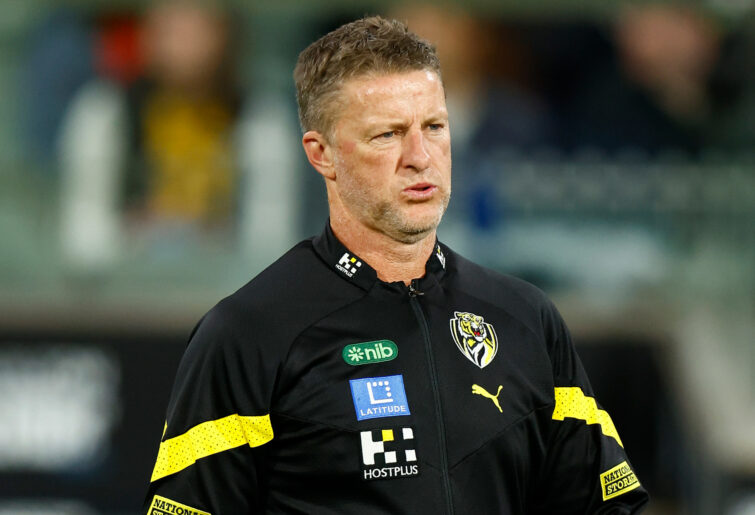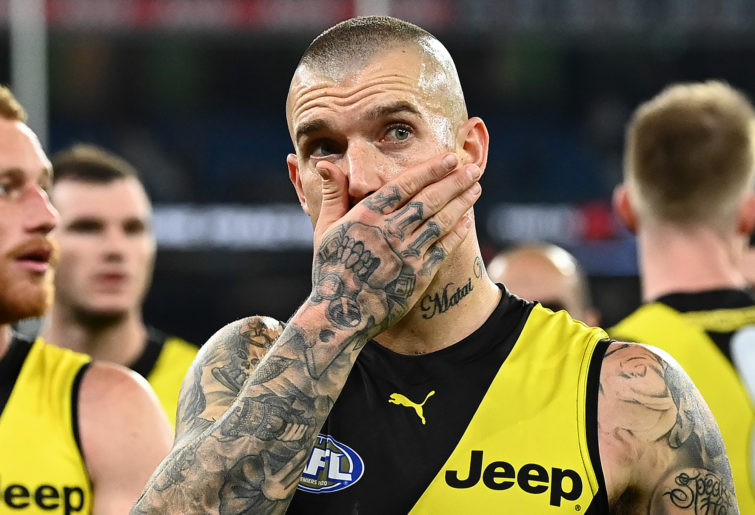In its 14th year, the coaching journey of Damien Hardwick at Richmond is over.
Popular opinion is that it will continue on elsewhere, at some point in the future. It should shock no-one if it doesn’t, and it should certainly be a case of *caveat emptor* for any club looking to hire him in the future.
History is littered with premiership winning senior coaches, some of the biggest names in the sport, that went for one coaching stint too many after long service elsewhere. Mick Malthouse going to Carlton for three miserable years is the most recent glaring example.
Tom Hafey failed at Geelong and Sydney after his glory days at Richmond, and to a lesser extent Collingwood. Ron Barassi was the messiah at Melbourne in the 80s, for no impact.
John Kennedy made his legend at Hawthorn but couldn’t do anything at North Melbourne. Robert Walls and Allan Jeans at Richmond. Denis Pagan at Carlton. Malcolm Blight at St Kilda.
It’s hard to re-start a car that hasn’t had the engine turned for a while, and it never quite runs the same again.
Hardwick yesterday declared the Richmond Football Club the love of his life, even after winning premierships as a player at Essendon and Port Adelaide, and as an assistant at Hawthorn.

Damien Hardwick. (Photo by Michael Willson/AFL Photos via Getty Images)
We all know the story.
Brought in to coach the 2010 season, the Tigers lost their first nine games to sit two games and 22% behind second last on the ladder. Bookies paid out on bets for the wooden spoon.
From Round 10 onwards, Richmond actually went 6-7 to lift themselves off the bottom. In hindsight, it was the first sign that Hardwick could be capable of something remarkable.
A steady rise up the ladder occurred over the next few seasons, before losing three elimination finals in a row between 2013-15. In 2013, the Tigers were only half a game outside the top four, and in 2015 were only two games behind top spot. The talent was there.
2016 was the *annus horribilus*. Richmond plummeted to 13th on the ladder in Hardwick’s seventh season, despite being the prime years of generational players like Dustin Martin, Alex Rance, Jack Riewoldt, Trent Cotchin and Brett Deledio, as well as others that would in time go down as greats of the club – Dylan Grimes, Shane Edwards, Kane Lambert, Nick Vlastuin, and Bachar Houli.
As I wrote halfway through 2016, Richmond was stuck in paralysis-by-analysis mode, playing slow and stodgy football, scared to take risks and playing with no freedom whatsoever. It was joyless to watch, and no doubt joyless to play.
Thankfully for his footballing legacy, Hardwick agreed that he had been focusing too much on what his list couldn’t do, and forgotten about what they could. He was not the coach, or indeed the man, that he had envisaged becoming. Something needed to change, and that something was him.
To the eternal credit of hundreds of thousands of Tigers supporters across the country, he became a new man – what has come to be known within the club as a “Richmond man”.
On the back of off-field vulnerability which led to on-field connection, the Tigers took the competition by storm from 2017-2020, winning three premierships with a ferocious brand of surge football. It was high on chaos and low on control.
It was more than just one man, of course, but he was the symbol for it. President Peggy O’Neal and CEO Brendan Gale backed him in, and along with Hardwick they became a triumvirate of off-field stability similar to Frank Costa, Brian Cook and Mark Thompson at Geelong, which also led to a period of success that lives on to this day.
The success took its toll though, with the 2020 COVID season clearly a factor. Not only had Richmond climbed the mountain for the third time, it was in the most arduous way. Away from the MCG where they had dominated for so long.
Away from the Tiger army that bayed for blood and at times was a genuine 19th man – just ask GWS players about the 2017 preliminary final.
What’s forgotten about the 2021 season, when Richmond dropped down to 12th, is that they were actually in the eight when they had their Round 14 bye, but the first cracks were showing.
The game before that bye, they gave up a four-goal lead halfway through the last quarter to lose to West Coast. This was a situation that would happen repeatedly over the next two years, including right up to last weekend against Essendon.
Most expected the Tigers to come out roaring after the bye in 2021, much as they had done in the previous four years. Instead, they kicked two goals in an entire game against St Kilda, lost to their bogey side in Gold Coast, and gave up a five goal lead when Collingwood kicked seven goals to one in the last quarter. The “Dimmasty” was over.
It is clear with hindsight that this was the beginning of the end. It is well documented that Richmond now has no wins from its last 13 games decided by less than a goal. In most of these, they have given up significant leads in the last quarter.

(Photo by Quinn Rooney/Getty Images)
Is there a coach or sporting organisation in the world, in similar circumstances to what the Tigers faced at the end of 2021, that would have agreed to part ways, and that a new voice was needed? Probably not. It would take the vision of Nostradamus and the courage of Martin Luther King to do it.
The only somewhat comparable situation we have seen in AFL circles this century, is when Bomber Thompson left Geelong at the end of 2010 after a losing preliminary final and two premierships in the previous four seasons. The Cats of course won the flag in Chris Scott’s first season.
Hardwick has already started copping flak for bringing in Tim Taranto and Jacob Hopper on seven-year-deals, and trading out high draft picks in order to do so. Such criticism does a disservice to the entire club and football department – there are list managers, football managers and CEOs, if not boards, that lead and sign off on such a move.
Hardwick was a players coach from the beginning all the way through to his final press conference. Many times over the years, he didn’t handle the media well when criticism of Richmond players was directed at him.
The steely glare of the old on-field hardman was never far from the surface. Composure was lost. The media piled on. The players loved him even more.
As seen by his pure and genuine emotion on the last day, he loved his playing list, and they loved him. Footy clubs are like mini-cults – you have to be devoted to the ideas that your coach pitches, and that it will ultimately lead to a premiership. Hardwick led the Tiger cult for 14 years with distinction, and delivered three of them.
He bows out a future Hall of Famer. Don’t be surprised if he never comes back.






























































































